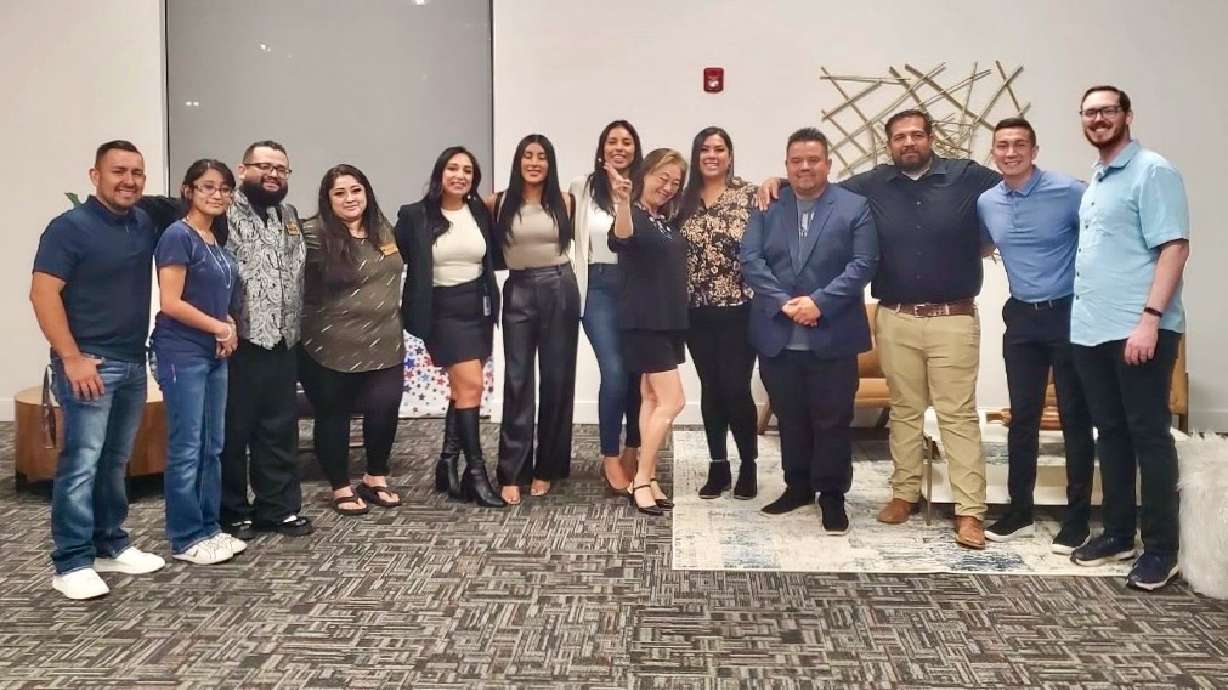Estimated read time: 4-5 minutes
This archived news story is available only for your personal, non-commercial use. Information in the story may be outdated or superseded by additional information. Reading or replaying the story in its archived form does not constitute a republication of the story.
- Some 7.1% of U.S. businesses with paid employees are Hispanic-owned, employing nearly 3 million workers.
- Desai Madrigal, of the Southern Utah Latino Business Alliance credits, in part, the entrepreneurial spirit of the children of immigrants.
- If U.S. Latinos were a stand-alone economy, their $3.6 trillion GDP would make the group the world's fifth-largest economy, says the Latino Data Collaborative.
WASHINGTON, Washington County — As a new wave of Latinos reaches adulthood, Desai Madrigal sees the entrepreneurial spirit in the community increasing exponentially.
He said the children of immigrants who first came to the United States 20 to 30 years ago are now launching their own careers, and he sees them taking a different track than their parents. "They're adults. Now they're building families. They're building businesses," said Madrigal, who helps lead a new Latino group based in Washington, the Southern Utah Latino Business Alliance.
Whereas newly arrived immigrants seem to gravitate to labor-intensive jobs — "just work, grind it and then pay my bills, and I'm good" — Madrigal says their kids are seeking other options, turning to the creation of their own businesses
"There's more than people think there are, and there's more to come. ... I think over the next 10 years, you'll see a bigger growth of Latino business owners just in general," he said, as younger generations seek more than a "nine-to-five, 30-years type thing."
Numbers crunched by the U.S. Census Bureau and released last week show that 7.1% of the nation's 5.68 million businesses with at least one paid employee as of 2021 were owned by Hispanics, or 406,086 of the total. They collectively employed 2.99 million workers, 4.8% of the 61.7 million total workforce in those 5.68 million businesses. A report issued Sept. 12 by the Latino Data Collaborative, meanwhile, said U.S. Latino gross domestic production — a measure of expenditures made "by and on behalf" of the population — totaled $3.6 trillion in 2022.
The Latino Data Collaborative said those numbers would make the U.S. Latino population the fifth-largest world economy if it were a stand-alone entity, trailing the United States, China, Japan and Germany.

"The U.S. Latino economy is expected to continue expanding faster than most first-world economies, supported by population growth, youth, business formation, improvements in educational attainment and general upward mobility," reads last month's report, sponsored by Wells Fargo, the financial services company.
Taken as a whole, the varied data points underscore the economic influence of the Latino population, which accounts for 19.5% of the overall U.S. population. The numbers also point to a growing role of Latinos in the U.S. economy in the years to come.
25,000 Hispanic-owned businesses in Utah
In the Washington County area in southwestern Utah, Madrigal sees Latinos operating a wide range of businesses — car dealerships, restaurants, construction companies, landscaping firms and more. The increasing number of businesses and the growing Latino population led to the formation last July of the Southern Utah Latino Business Alliance, which operates within the Washington Area Chamber of Commerce.
As debate rages over the number of immigrants in the United States unlawfully, Madrigal maintains that the growing entrepreneurial spirit seems to be coming from a segment of Latinos with deeper roots in the country, like himself. Now 44, he was brought from Mexico by his parents to the United States when he was 9 and now runs a home inspection business based in Washington.
"Most people think that Latinos are immigrants, but they're not realizing their parents were immigrants, and a lot of these kids were born here," said Madrigal, alluding to the new crop of entrepreneurs. "These are now the business owners, and these are the ones becoming the business owners."
Most Latino-owned businesses, at least in the Washington County area, probably employ 10 or fewer workers, Madrigal said. Still, Aikta Marcoulier, the U.S. Small Business Administration administrator for the six-state region that includes Utah, indicated that the cumulative impact is noteworthy.
"Economic data also shows that 5 million Latino-owned businesses contribute $800 billion each year to our local economies. In Utah, Hispanics own nearly 25,000 businesses employing thousands of workers and contributing millions of dollars to their local cities and towns," she said in a column released last month in connection with Hispanic Heritage Month, which goes through Tuesday.
The U.S. Census Bureau data doesn't look to the future, only offering a snapshot in time.
Read more:
The top industry sector for Hispanic-owned businesses was construction, according to the Census Bureau, followed by accommodation and food services. The educational attainment of the largest bloc of Hispanic business operators was a high school diploma, accounting for 23.6% of the total, while 21.9% of them had a bachelor's degree. For non-Hispanic business operators, the largest single chunk, 31.9%, had a bachelor's degree, followed by those with just a high school diploma, 17.7%.
While the Census Bureau kept neutral on the economic role of Latinos going forward, the Latino Data Collaborative report was bullish. "U.S. Latinos and Latinas are not only leading in GDP growth but also in entrepreneurship, innovation, productivity and labor force expansion. Investing in this cohort means investing in the current and future prosperity and competitiveness of our entire country," Sol Trujillo, chairman of the board of the group, said in introducing it.










